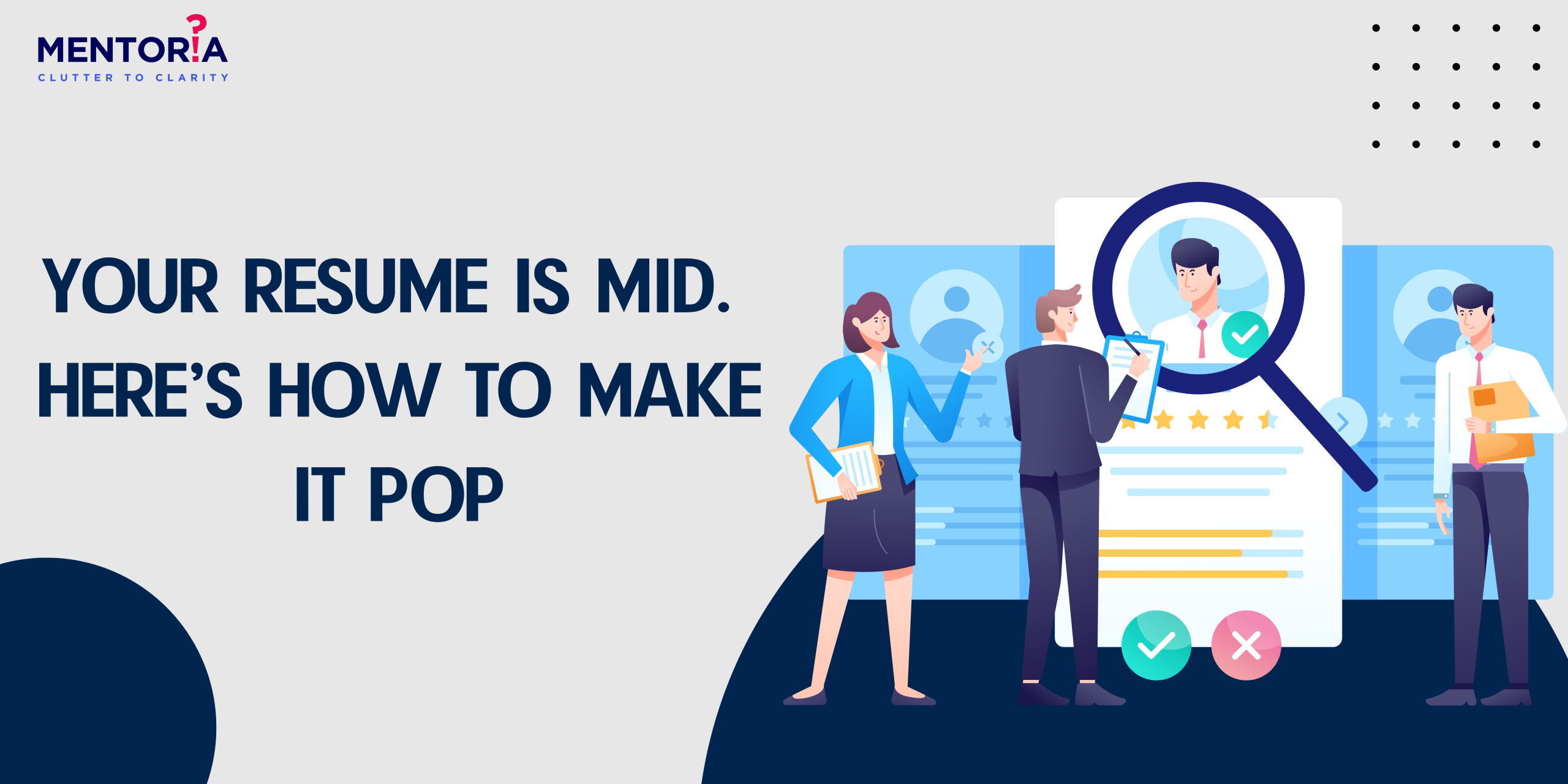7 Common Interview Mistakes that Most of Us Make
Why is giving an interview such a tricky task? No matter how experienced a campaigner you are, the very thought of giving an interview brings up a feeling of restlessness or anxiety. All that only gets amplified if you are a fresher or new to the job market.
What makes Interviews so Challenging?

If you have an interview lined up, first of all, congratulations! In this competitive economy, that’s no easy feat. Most people dread the interview round. But why is that? What about this process makes it especially difficult and frustrating?
1. Every interviewer is different
For starters, you need to realise no two interviewers are the same. They all come with their own sets of biases and preferences (Objectivity is a myth when it comes to judging others). So, the groundwork needs to be laid down to deal with an interviewer. You need to understand what it is they are looking for in the person who can be described as “the best fit for the role”. Play into the hands of their prejudices by doing your research beforehand on the interviewer, whenever possible. Chances are, you might find them on LinkedIn.
2. The requirements will vary
Even if you end up applying for the same position at a different company, the requirements may heavily vary in terms of the roles and responsibilities, and what is expected of you.
47% of the candidates failed the job interview because they didn’t have enough information about the company they applied to. – LegalJobs
See? You need to have what every single company EXACTLY wants from you.
3. Doesn’t feel natural to talk about yourself
Talking about yourself and bringing up past glories might just not come naturally to you. But then, an interview isn’t possible without bringing this information to light. The only way to get that much-deserved job is to become your own personal wingman and showcase to the world why you are the most deserving candidate.
4. Uncertainty about the questions/structure of the interview
These days interviewers have been throwing curveballs left and right when it comes to the interview questions and the structure of the interview itself. Off the top of your head, how many different types of interviews can you think of? Panel interviews, sequential interviews, lunch interviews, portfolio-based interviews, stress interviews, informal interviews, puzzle interviews, and so on. You are always in for a surprise when you sit down for an interview.
5. Luck is necessary nonetheless
The interviewer is only human. As mentioned previously, they can never be completely objective with their assessment. Even you have only so much control over the circumstances. There are too many uncontrollable factors at play here. So, just stick to your plan and do all that’s in your hand.
Now that it has been established that giving an interview is not a walk in the park, let’s move on to identifying the common interview pitfalls that even the best candidates are susceptible to.
Common Interview Mistakes you have Probably Made

1. Badmouthing previous employers
No doubt, you might have a lot to say about your professional exes, a lot of it being unsavoury in nature. But an interview might not be the best place to air out this dirty laundry. When you start criticising your previous employer unabashedly, it leaves a bad impression. It shows that you might not gel well with others and that you can have a negative attitude.
How do you fix this?
Instead of focusing on the negatives, talk about your learnings from the previous jobs. Mention how you overcame the conflicts, despite unfair circumstances. Be the bigger person in the equation.
2. Leaning too heavily on jargon
As trained professionals, speaking in work slang comes naturally to many. But a lot of these terms might be specialised and esoteric to those you were working with previously. All organisations end up developing their own acronyms and shorthands. People often end up making the mistake that the rest of the population would be privy to these terms, but they most certainly are not.
How do you fix this?
Make sure you do not aggravate/confuse the interviewer by throwing unnecessary technical terms. Instead of impressing them, you might end up with the very opposite effect. If you are using a technical term, supplement it with a definition and an example.
3. Being too modest about your achievements
This was mentioned in the previous section about how it feels unnatural to toot your own horn. Well, nobody else is going to do it for you. And who knows? You might be put in a stress interview, where the interviewer(s) will keep grilling you. In these situations, if you end up doubting yourself, there will be no callbacks.
How do you fix this?
Use the excuse of the interview, to actually show yourself some self-love and blanket yourself in a cloud of well-deserved praise. The interviewer needs to know what a capable and worthy candidate they have met!
4. Not asking questions
All candidates walk into interviews with piles of questions – curiosity about the employer, the organisation, roles, perks, and so much more. But when the interviewer actually gives them a chance to voice their questions, they go mute. It simply feels awkward or tasteless to ask questions to a superior.
How do you fix this?
You need to understand that there’s a reason why the interviewer is giving you the space to voice your doubts. They understand that the interview is a two-way process where both parties need to learn more about each other. They would want to partner with someone who is comfortable and open to working with them. And more importantly, everyone wants their team to consist of inquisitive individuals. So, if you don’t fire any questions, they might dismiss you as disinterested or not curious.
5. Broaching the topic of salary first
Yes, this is the big question that occupies the minds of everyone out there. The answer to this question usually makes or breaks these scenarios. And it’s not like you are not supposed to ask the question. The interviewer understands the implications of this factor on your application. But what people end up doing wrong is rushing into this question.
How do you fix this?
Instead of bringing this up first, let the interviewer mention it. They are responsible for conveying the important details to you, and thus cannot avoid bringing this up. So, once they bring this issue to the table, you can start clarifying and negotiating accordingly. Worst case scenario, if the interviewer doesn’t bring it up, you can openly ask about it towards the end.
6. Aggressive followups
Once you are done with your interview, you can’t wait to find out the result, whether good or bad. In this fit of anxiety/excitement, a few tend to go overboard and start hounding the interviewer or representative for their decision. This might end up having an ill effect and ruin a good interview.
How do you fix this?
Be patient. Thank the interviewer/representative for the chance to interview first, and mention your zeal for the role. Tell them that you hope to hear from them soon. After that, the only thing you can do is wait and keep looking for other places. There’s no point in getting frustrated by a lack of response, which is a common grievance applicants have from a lot of companies.
7. Not talking to experts in the field
Now that you know the challenges waiting for you and some of the common mistakes people make, you must be thinking ‘If only there was an expert to guide me…”
Talking to an expert will give you the best idea of how you should go about the process of applying for a job. A mistake people often make is not consulting with experienced individuals who know the ins and outs of the process, and who can guide them to become #JobReady.
How do you fix this?
A sure-fire way to fix this would be to get in touch with an expert who knows exactly what a recruiter might think and want. But what are the chances of that happening? Well, you are in luck. With Mentoria’s CV review package, you have the chance to stand out from the pack and make a lasting impression on your future employers. We have different CV Review packages to match your #JobReady needs – choose the one that suits you best and get a revamped CV, interview preparation session with our HR experts, guidance on building an effective job application strategy and more! Call now to know more about our plans from our career mentors.
Remember to feel good about the fact that you made it to the interview round. On average, only 20% of applicants make it to the interview round (Source: Forbes).
The fact that you got a callback for an interview means the organisation believes you have what it takes to be the right fit for them. From this point forward, all you need to do is reconfirm their views on this.






